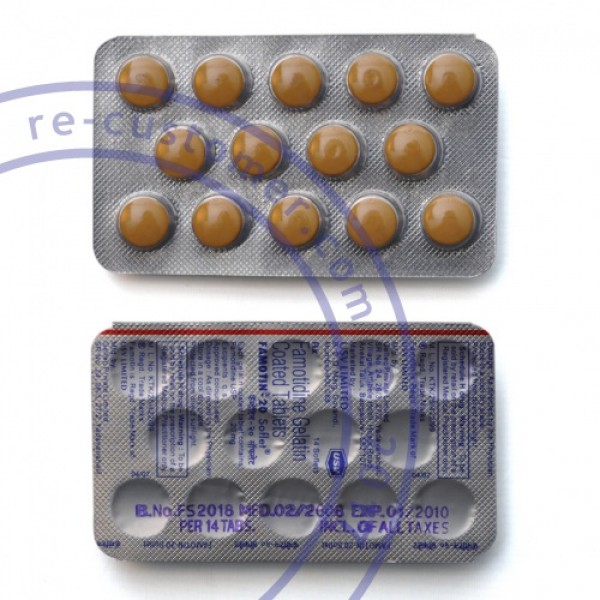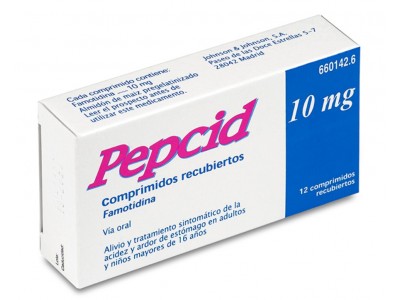What is Pepcid?
Diseases of the gastrointestinal tract are common in our lives. If in a timely manner do not treat such illnesses, an ulcer may form. For the treatment of exacerbation in such diseases, the drug Pepcid is often the best solution. It operates quickly, has a cumulative effect and is inexpensive.
This medicinal product is available in the form of pills containing either 20 or 40 mg of active substance. This agent is called Famotidine. Besides this, the pill contains auxiliary components. Their list is printed on the packaging of the drug. This is one of the most popular medications for the treatment of gastrointestinal tract diseases. It is sold at many regular drugstores. You can also buy Pepcid online.
In what kind of disease treatment, Pepcid is helpful?
Pepcid indications contain ulcers of the duodenum and stomach, which is in the stage of exacerbation. This medication is also administered in case of symptomatic ulcers and also to prevent their formation. It is used for reflux esophagitis, as well as gastrinoma. The use of the drug gives a good result in case of a gastrointestinal and intestinal bleeding, where it is used in combination with other medicines. Sometimes, this medication is prescribed in case of erosive gastroduodenitis, as well as for the prevention of aspiration of gastric juice, which is conducted under general anesthesia (Mendelssohn syndrome).
What should I discuss with my healthcare provider before taking Pepcid?
Reviews of medical specialists say that this medicine has a few contraindications and is convenient to take. This medication can be used exclusively after the doctor prescribes it to you. For example, Pepcid is never prescribed during pregnancy and during breastfeeding. It is also prohibited to take it during childhood and in case of hypersensitivity to the constituents of Pepcid. Also, the drug is not used in case of sensitivity to other drugs that are blockers of histamine H2 receptors. With special caution, the medication is prescribed in patients with hepatic and renal insufficiency, as well as with liver cirrhosis, which is accompanied by a history of porosystemic encephalopathy.
How should I take Pepcid?
Do not chew or bite Pepcid pills. The quality and amount of liquid that you drink to wash down the pills is very important for the maximum effect of the medication. To wash down Pepcid choose non-carbonated water at room temperature (not less than cup). But tea, coffee, fruit juices reduce the effectiveness of drugs, as well as carbonated water.
Pepcid dosage information
In the presence of gastrinoma, treatment begins with Pepcid dose of 20 mg, which should be administered to the patient every six hours; if the treatment lasts for a long period of time, then at a certain point (determined by the physician),it will be necessary to adjust the dose. This new dose depends on the patient's condition and the production of hydrochloric acid in the stomach. Patients with kidney pathology (creatinine clearance is below the mark of 30 ml min, and the serum plasma values exceed 3 mg dl) daily dose is reduced to 20 mg. The interval between taking medication is increased to 36-48 hours. If there are any problems in the work of the liver, then Pepcid 20 mg must be taken with extreme caution. The drug in this case is administered in small doses.
If the patient has an ulcer of the stomach and duodenum, which is in the stage of exacerbation, the drug is prescribed in the amount of 40 mg. This amount is taken once a day. You can take Pepcid twice a day for 20 mg. If there is a need, then the daily dose is adjusted to 80-160 mg. The duration of the therapeutic course is four to eight weeks.
To prevent exacerbation of ulcers of the stomach and duodenum, take Pepcid 20 mg before going to bed. In case of reflux esophagitis take 20 mg in the morning and evening. The treatment usually lasts about six weeks. If necessary, the dose is increased to 80 mg and divided into two doses (40mg+40mg). Duration of treatment depends on the state of health of the patient. To prevent the release of gastric contents during the period of generalanesthesia, the pills are used in an amount of 40 mg. The drug may be taken on the eve of an intervention or on the day of the procedure.
What may interact with?
Pepсid has the ability to inhibit the metabolism of Phenazone, Aminophenazone, Diazepam, Hexobarbital, Propranolol, Lidocaine, Phenytoin, Aminophylline, Theophylline, indirect anticoagulants, tricyclic antidepressants, Glipizide, Buformin, Metoprolol, Metronidazole, caffeine. It also increases the absorption of amoxicillin andclavulanic acid. Pepcid is compatible with 0.18 and 0.9% NaCl solution, 4 and 5% dextrose solution, 4.2% sodium bicarbonate solution. Antacids and sucralfate slow the absorption of Famotidine. Pepcid reduces the absorption of Itraconazole and Ketoconazole. Drugs that depress the bone marrow increase the risk of developing neutropenia.
Always discuss with your physician the medications that you’re currently taking. Medications that are compatible with Pepcid are sold in many drugstores; also you may buy Pepcid online at the lowest price.
What should I watch for while taking Pepcid?
Pepcid reviews say that most patients are satisfied with this medication. They note that after the first application, there is a noticeable therapeutic effect. Pain stops, the aggressiveness of the gastric juice is reduced. This medical product is usually well tolerated by patients and rarely causes negative effects.
In order for the ulcers to cure completely, the medication must be used for a long period, continuously.
Keep in mind that when you take Pepcid oral it is important to quit bad habits. Alcohol and cigarettes act very aggressively on all internal organs of the body and also considerably slow down the healing of ulcers and other pathologies of the gastrointestinal tract.
Pepcid side effects
Side effects are rare enough when taking Pepcid (Famotidine). But still it is important to know that this medication can negatively affect different organs and systems:
- Organs of digestion. Here are the following effects: nausea, vomiting, abdominal pain, constipation or diarrhea, decreased appetite, dry mouth
- Genitourinary system. Namely: amenorrhea, decreased libido, gynecomastia, grows of mammary glands, appears exclusively in males, hyperprolactinemia, an increase in the level of the hormone prolactin, which is responsible for the production of milk in the mammary glands
- Hematopoiesis. Pepcid side effects are manifested by: anemia, leukopenia and decrease in leukocytes in the blood, neutropenia, a decrease in the number of neutrophils, thrombocytopenia, and a decrease in platelets
- Cardio-vascular system. Vasculitis, arrhythmia, bradycardia, to slow heart beat (less than 60 beats per minute)
- CNS. Namely: anxiety, a sense of anxiety, dizziness and headaches, nervousness, confusion, noise in the ears, apathy, insomnia, in very rare cases, hallucinations are possible
- Allergic reactions: urticaria, pruritus, anaphylactic shock
Where can I keep Pepcid?
Pepcid should be stored in a dry, cool place; therefore do not keep this medication in immediate proximity to sources of heat, make sure it will not be exposed to direct sunlight.
The storage temperature should be not less than 15 and not higher than 30 degrees Celsius (59-86°F).
More detailed information on proper storage can be provided if you buy this drug in a traditional drugstore or if you buy Pepcid from Portugal pharmacies online.
There are no reviews for this product, be the first to leave your review.

No questions about this product, be the first and ask your question.





